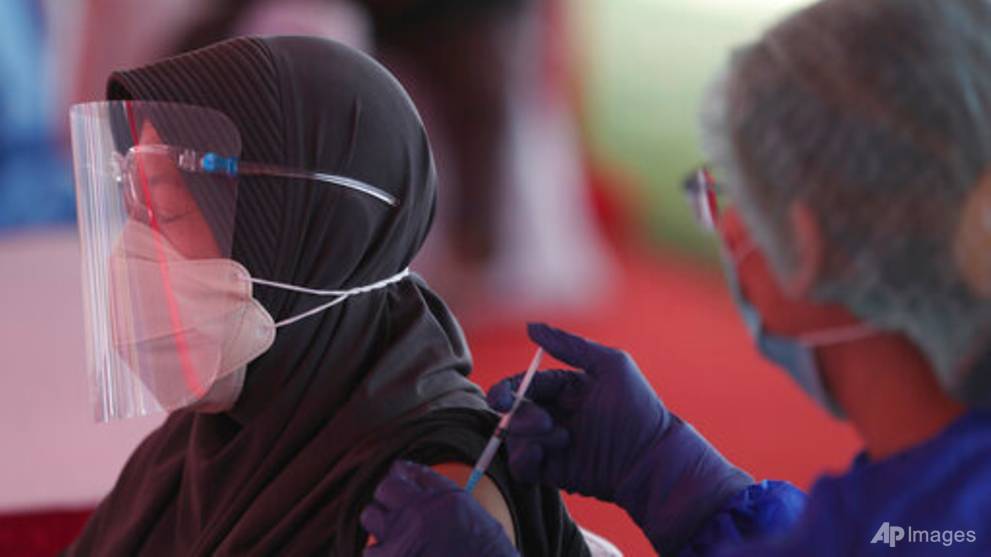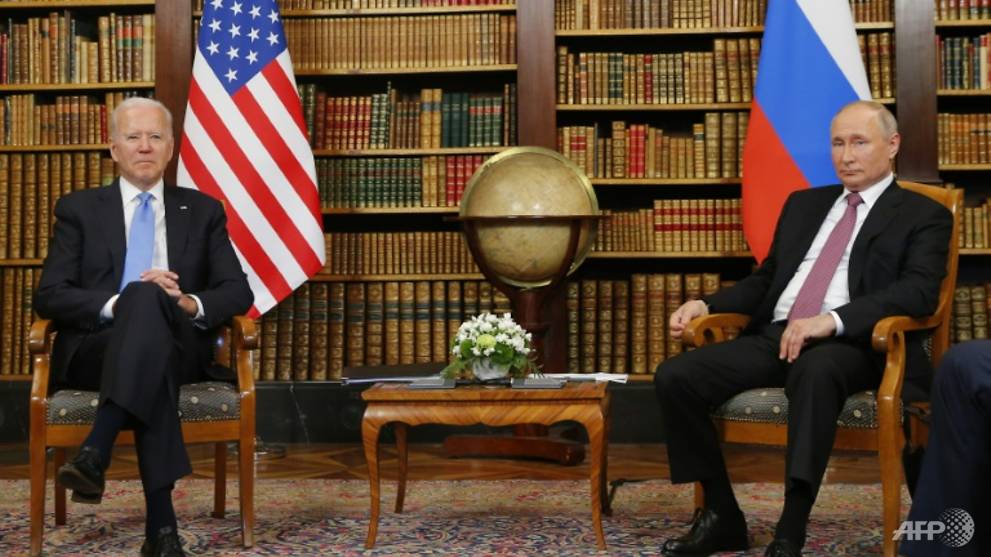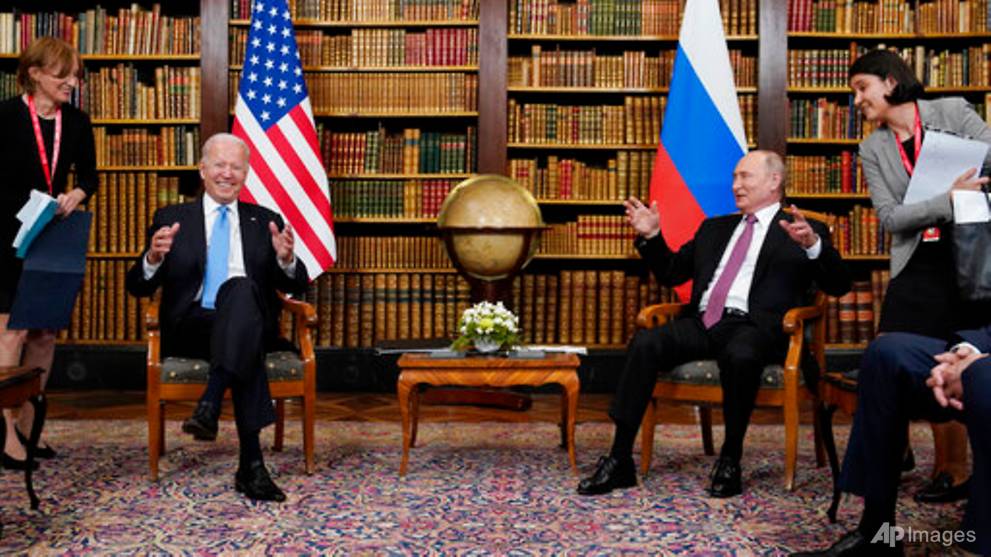GENEVA: Joe Biden and Vladimir Putin sought to cool tensions in the combustible US-Russian relationship at their first summit in Geneva on Wednesday (Jun 16), with the US president saying his Kremlin counterpart doesn't want a new Cold War.
The two leaders emerged cautiously positive after more than three hours of talks, including two hours alone with just the Russian foreign minister and US secretary of state.
"The conversation was absolutely constructive," Putin told reporters, adding they had agreed for their ambassadors to resume their posts in a gesture of diplomatic healing.
Biden called the session, conducted at an elegant villa on the shores of Lake Geneva, "good".
The US president, who was ending a gruelling diplomatic tour of Europe, said he and Putin explored working together on areas where the former superpower rivals have overlapping interests, including the Arctic, Iran and Syria.
Biden told a press conference that the two biggest nuclear powers "share a unique responsibility" on the world stage.
However, Biden emphatically warned the Kremlin against any cyberattacks on what he said were 16 clearly defined areas of US critical infrastructure.
Those areas, which he did not make public, "should be off limits". Violations, Biden warned, would lead to a US response in kind - "cyber".
Washington accuses Moscow of, at a minimum, harbouring cyber ransomware gangs and also conducting the SolarWinds cyberattack on US entities.
US intelligence has also claimed that Russian agencies conducted a dirty tricks campaign to try and disrupt the last two presidential elections.
But to suggestions that the world could witness a repeat of the 20th century's Cold War - when Washington and Moscow spent decades in a nuclear standoff before the Soviet Union finally collapsed - Biden said Putin knows his limits.
"I think that the last thing he wants now is a Cold War," Biden said.
DIPLOMATIC BREAKDOWN
Diplomatic relations between Moscow and Washington had all but broken down since Biden took office in January.
After Biden likened Putin to a "killer", Russia in March took the rare step of recalling its ambassador Anatoly Antonov. The US envoy, John Sullivan, likewise returned to Washington.
Those deep disagreements remain in place.
The summit got off to a good start, with the two leaders shaking hands for the cameras.
But Putin later issued withering rejections of criticism over his human rights record and allegations of harbouring cyber criminals.
He claimed instead that "the largest number of cyberattacks in the world are carried out from the US".
Putin also sought to deflect criticism of his treatment of opponents - many high profile critics have been killed in Russia during his rule and the media is almost entirely muzzled - saying that the United States had bigger problems.
Biden called Putin's argument "ridiculous".
RESPECT
The offer of a more understanding US-Russian relationship - if not necessarily a more friendly one - went a long way toward what Putin is reportedly seeking: increased respect on the world stage.
Biden's reference to the United States and Russia as "two great powers" was sure to please the Kremlin leader, who has dominated his country for two decades, infuriating the West with invasions of Ukraine and Georgia, and often brutal crushing of political dissent.
Republican opponents back in Washington called Biden naive for his contention that reaching out to Putin will encourage him to bring Russia out of the diplomatic cold.
"It is clear to me that Putin could care less about how he's viewed by others," Republican Senator Lindsey Graham tweeted, saying Biden had "miscalculated".
COLD WAR SETTING
The choice of Geneva recalled the Cold War summit between US president Ronald Reagan and Soviet leader Mikhail Gorbachev in the Swiss city in 1985.
The summit villa, encircled with barbed wire, was under intense security. Grey patrol boats cruised along the lakefront and heavily-armed, camouflaged troops stood guard at a nearby yacht marina.
But in contrast with 1985, tensions are less about strategic nuclear weapons and competing ideologies than what the Biden administration sees as an increasingly rogue regime.
Putin came to the summit arguing that Moscow is simply challenging US hegemony - part of a bid to promote a so-called "multi-polar" world that has seen Russia draw close with the US's arguably even more powerful adversary China.
In a pre-summit interview with NBC News, he scoffed at allegations that he had anything to do with cyberattacks or the near-fatal poisoning of one of his last remaining domestic opponents, Alexei Navalny.
For Biden, the summit ended an intensive first foreign trip as president. He arrived in Geneva after summits with NATO and the European Union in Brussels, and a G7 summit in Britain.
Unlike in 2018, when Biden's predecessor Donald Trump met Putin in Helsinki, there was no joint press conference at the end of the summit.
The US side clearly wanted to avoid the optics of having Biden sharing that kind of platform with the Russian president.
Adblock test (Why?)
https://news.google.com/__i/rss/rd/articles/CBMicWh0dHBzOi8vd3d3LmNoYW5uZWxuZXdzYXNpYS5jb20vbmV3cy93b3JsZC9iaWRlbi1wdXNoZXMtcHV0aW4tc3RhYmxlLWdyZWF0LXBvd2Vycy1yZWxhdGlvbnNoaXAtdXMtcnVzc2lhLTE1MDI3OTkw0gEA?oc=5
2021-06-16 20:15:00Z
52781671282824





